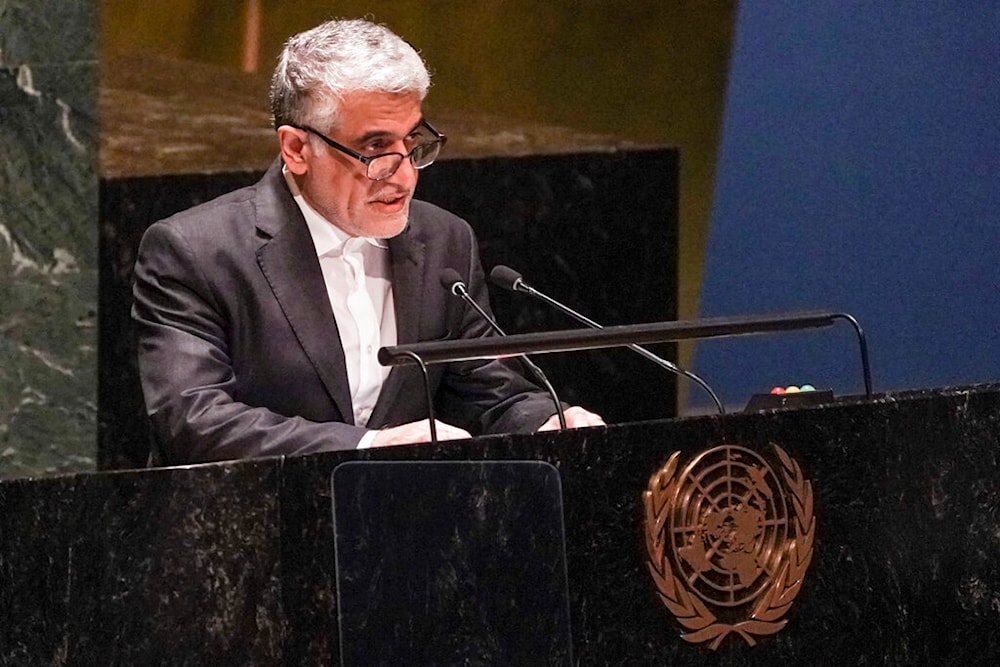Iran rejects British minister's accusations; slams UK
Amir Saeid Iravani vehemently rejected unsubstantiated accusations against Iran made by British Minister of State for the Middle East, Tariq Ahmad, during the United Nations Security Council's meeting.
-

Iran's United Nations Ambassador, Amir Saeid Iravani, addresses the UN General Assembly on February 23, 2023. (AP)
Amir Saeid Iravani, Iran's United ambassador to the United Nations, vehemently rejected unsubstantiated, "baseless" accusations against Iran made by British Minister of State for the Middle East, Tariq Ahmad, during the United Nations Security Council's meeting on "The situation in the Middle East, including the Palestinian Question."
Iravani, in letters to the UN chief and the Security Council president, asserted that Ahmad had neglected "his own country’s responsibility in the current situation in the Middle East and the UK’s destabilizing policies, and attempted to shift blame onto the Islamic Republic of Iran.”
Iravani emphasized that the United Kingdom has played a significant role in the prolonged suffering of the Palestinian people, dating back to the Balfour Declaration, which marked the beginning of nearly a century of hardship for Palestinians. He pointed out that the UK's consistent support for Israeli war crimes and "genocidal aggression" against Palestinians and countries in the region restricts its moral authority to pass judgment on the intentions and policies of others.
Throwback to Balfour
During the Security Council meeting, Ahmad had claimed that Iran poses an unacceptable threat to the region through "destabilizing activities" and "long-term support for its proxies and partners."
Iravani countered this by highlighting the historical context of the Balfour Declaration, a letter from Britain's then-Foreign Secretary Arthur Balfour to Lionel Walter Rothschild, a prominent figure in the British Jewish community. The declaration, issued in 1917 during World War I, set the stage for the occupation of Palestine and is considered a precursor to the 1948 Palestinian Nakba, during which Zionist armed groups, trained by and allied with the British in World War II, forcibly displaced over 750,000 Palestinians from their homeland.
Iravani also affirmed that the Israeli occupation "seeks to divert public opinion from its brutal aggression and terrorist practices against the Palestinian people by directing accusations towards Iran."
In messages addressed to the Secretary-General of the United Nations, Antonio Guterres, and to the Ecuadorian representative who chairs the UN Security Council, Iravani rejected what was stated in a letter from the Israeli representative to the President of the Security Council, "which is based on lies and baseless accusations."
The Iranian representative emphasized that his country "is committed to UN resolution 2231 regarding the Iranian ballistic missile program," confirming that the "claims of the Israeli entity are unfounded."
Iran backs the oppressed
Earlier, Iranian President Ebrahim Raisi affirmed that the ongoing genocide and massacres against the children of Gaza are a tragedy for humanity as a whole, especially for those who claim to champion human rights.
During his speech before the Iranian Shura Council, Raisi stated that the blood of innocent Palestinians would bring an end to the rule of the Israeli regime, and predicted a victory for Palestine.
The Iranian president emphasized that Iran's support for the Palestinian people aligns with the constitution and its provisions regarding their support of the oppressed. He also highlighted it as a part of the principles of Iranian foreign policy.
"Our support for Gaza and Palestine is based on the Constitution. Backing the oppressed is among the foundations of the Constitution. Thus, supporting Palestine has been the foremost issue of the [Islamic] Revolution since its onset," the Iranian President told the gathering.
Raisi went on to dismiss any suggestion that the regional dynamics could compromise the constitutional principle behind Iran's stance on Palestine.
"We cannot stop adhering to the principles. The inclinations of some parties in the region will not compromise this principle of the Constitution," he underlined.
Read more: 'Hand on trigger, response to change Palestine current map': Iran FM

 4 Min Read
4 Min Read








